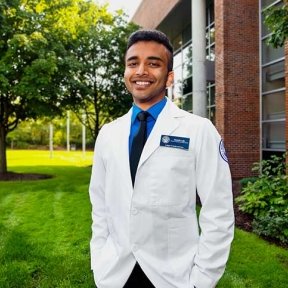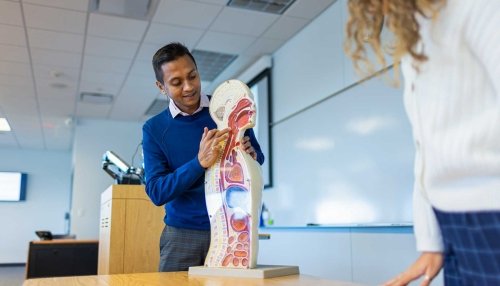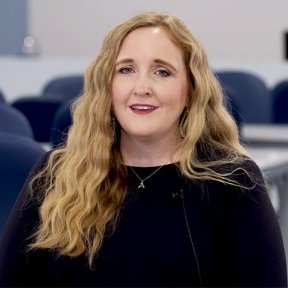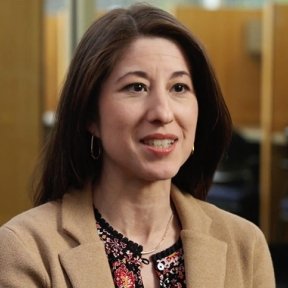Make a Difference
If you are passionate about helping others, enjoy making a difference in people's lives, and seek a stable and rewarding career, Speech-Language Pathology (SLP) could be the ideal choice for you. SLPs play a crucial role in helping individuals of all ages who experience communication and speech difficulties.
Program Highlights
At Midwestern University, you will develop the skills you need for a rewarding career helping people with speech and language disorders. As a student in the Speech-Language Pathology program, you'll benefit from a student-centered curriculum, relevant research opportunities, and varied clinical experiences that will prepare you to address the needs of people, with communication and swallowing disorders, of any age.
Caring Faculty
Under the guidance of our caring faculty experts, you will be able to build your future as a speech-language pathologist in a wide range of practice settings.
Learn More
Learn more about the requirements and find quick links to relevant catalog content to guide you in your application process.
Individuals applying for admission to the College of Health Sciences Speech-Language Pathology Program must submit documentation of the following minimum requirements before the academic year commences for the incoming class:
- Completion of a baccalaureate degree from a regionally-accredited institution in Communication Sciences and Disorders, inclusive of the courses listed below, or
- Completion of a baccalaureate degree from a regionally-accredited institution in an area other than Communication Sciences and Disorders with completion of a specified sequence of prerequisite coursework including all of the following:
- Anatomy and Physiology of Communication Mechanisms
- Phonetics
- Speech and Language Development
- Speech and Hearing Science
- Statistics
- One course each in biological sciences, physical sciences, and social sciences
- Minimum undergraduate grade point average (GPA) of 3.0 on a 4.0 scale. Grades of C or better for prerequisite courses; grades of C- are not acceptable.
- Minimum grade point average (GPA) of 3.0 on a 4.0 scale in the undergraduate major.
- Oral and written communication skills necessary to interact with patients and colleagues.
- Two letters of recommendation from individuals who can comment on academic, clinical, and professional experiences of the applicant.
- A completed CSDCAS application.
- Commitment to abide by the Midwestern University Drug-Free Workplace and Substance Abuse Policy.
- Passage of the Midwestern University criminal background check.
Please note that the application deadline is March 1.
*Subject to change
Leveling Track
Individuals who do not meet the minimum prerequisite coursework requirements for the Traditional Track may apply for admission to the College of Health Sciences Speech-Language Pathology Program Leveling Track. To select this track, individuals must designate this option during the application process, and submit documentation of the following minimum requirements before the academic year commences for the incoming class:
- Completion of a baccalaureate degree from a regionally-accredited institution with completion of prerequisite coursework in the following areas:
- Statistics
- Biological Sciences
- Physical Sciences (physics or chemistry)
- Social Sciences
- Minimum undergraduate cumulative grade point average (GPA) of 3.0 on a 4.0 scale. Grades of C or better for prerequisite courses; grades of C- are not acceptable for the prerequisite courses listed above.
- Oral and written communication skills necessary to interact with patients and colleagues.
- Optional: Scores on the general and writing sections of the Graduate Record Examination (GRE) may be submitted using the Midwestern University institution code of 4160. Submission of GRE scores is not required for admission.
- For more information about the GRE contact Educational Testing Services (ETS) at 866-473-4373 or visit the GRE website.
- Two letters of recommendation from individuals who can comment on academic, clinical, and professional experiences of the applicant.
- A completed CSDCAS application.
- An interview with faculty (invitation only).
- During the on-campus interview day, write an essay given a clinical writing prompt (for interview candidates only).
- Commitment to abide by the Midwestern University Drug-Free Workplace and Substance Abuse Policy.
- Passage of the Midwestern University criminal background check.
The Speech-Language Pathology Program provides academic, research, and clinical experiences that culminate in the Master of Science (M.S.) in Speech-Language Pathology degree. The program of study spans seven quarters of study, with degree completion targeted for 21 months. Five quarters of didactic coursework are followed by two quarters of internship experiences. Students may elect to complete a master's thesis. Graduates of the program will be prepared for entry-level positions as speech-language pathologists in a variety of educational or healthcare settings.
The Midwestern University Speech-Language Pathology Program’s mission is dedicated to the professional development of speech-language pathologists to work in a variety of healthcare and educational settings. As clinical scientists they will serve the communication and swallowing needs of individuals across the lifespan through responsive, compassionate, ethical and evidence-based practice.
Additional information about the program can be found in the MWU catalog.
*Subject to change
The professional master's curriculum is composed of 54 to 57 required course credits (quarter hours) for the first academic year, 53 to 56 required course credits for the second academic year for a total of 107 to 113 quarter credits.
Clinical practica are scheduled in the second, third, fourth, and fifth quarters of the curriculum.
Advanced practica, or full-time placements in healthcare or educational settings, are secured for the last two quarters of the curriculum.
Total Quarter Credits in the Professional Program is 107-113. The total number of quarter credits is dependent upon whether a student pursues the thesis or non-thesis track.
*Subject to change
This year, several merit-based scholarships will be made available to prospective students who are deposited into the Speech-Language Pathology program at Midwestern University during the upcoming admissions cycle.
Scholarships are competitive and will be awarded by a faculty admissions committee, with decisions made after a careful review of all application materials, including letters of support and any personal statement. Awards will be made to exceptional students within the upcoming cohort who have demonstrated a strong record of academic achievement, community and pre-professional engagement, and/or leadership, and who have also exhibited a strong commitment to future learning.
Applicants to the program will be automatically considered for scholarship review by a faculty committee.
We seek to transform outstanding students into clinical scientists who dedicate themselves to the highest standards of the profession of speech-language pathology. They will execute the full scope of clinical practice on behalf of individuals with communication and swallowing disorders.
The Master of Science in Speech-Language Pathology Program seeks to:
- Foster a humanistic learning environment for students;
- Foster a holistic and compassionate approach to patient care;
- Graduate competent speech-language pathologists who possess the levels of clinical judgment, understanding, empathy, technical skills, and independence to begin professional practice;
- Install a philosophy of lifelong learning in speech-language pathology students;
- Promote research and scholarly activity among the faculty and students;
- Develop a clinical practice in the Midwestern University Clinic that provides a broad range of evidence-based experiences for speech-language pathology students;
- Contribute to the overall growth and academic excellence of Midwestern University by supporting its Mission and Vision.
- Access SLP Strategic Plan (PDF)
- Students engage in practica at the Speech-Language Institute, housed in the Midwestern University Multispecialty Clinic, and other community-based settings for four quarters.
- Two advanced practica of up to twelve weeks’ duration are completed in educational and/or healthcare settings.
- Our program is affiliated with public and private schools, in-patient rehabilitation hospitals, outpatient rehabilitation hospitals and facilities, and private practice clinics to ensure a range of practicum opportunities for every Midwestern student.
The members of the Midwestern University Advisory Board are:
Julie Anderson: Ms. Anderson is the Director of Student Services for Elementary and ESY for Plainfield Consolidated School District 202. Ms. Anderson currently oversees all of the special education services in eighteen services elementary schools. She continued to providing support for district speech language pathologists and vision and hearing itinerant professionals.
Lilli Bishop: Ms. Bishop is an outpatient therapist at Northwestern Medicine Kishwaukee Hospital in DeKalb. She has worked in a multitude of settings including center based, school, skilled nursing facilities, memory care centers, acute hospital, telehealth, and home health. Ms. Bishop is an ISHA Fellow.
Joan Blasingame: Ms. Blasingame is the Speech Pathology Coordinator at Rush Copley Medical Center in Aurora where she has been employed for over twenty years. Her primary area of coverage is acute rehabilitation, and covers other areas as needed. She is certified in NMES, LSVT, and FEES.
Amy Coath: Ms. Coath is 2016 graduate of the MWU SLP program. She works as an SLP at Cove School in Northbrook which serves students with complex learning disabilities. Prior to attending MWU, she spent 20 years working at Misericordia in a variety of capacities including staff trainer, supervisor, and administrator.
Michelle Frauendorff: Ms. Frauendorff is VP of Rehab Services for an Illinois based long term care corporation that covers several Midwest states. Besides providing clinical support to those teams, she is also involved with billing and denial management of claims. She has worked in SNFs, assisted living and home health care environments.
Clare Gertsch: Ms. Gertsch is an acute care therapist at Advocate South Suburban Hospital. Prior to working in acute care, she worked at a variety of skilled nursing facilities. Her areas of interest include neurological disorders, head and neck cancer and dysphagia.
Catherine (Kate) H. Gottfred, Ph.D. CCC-SLP, BCS-CL. Dr. Gottfred founded Language Empowers All People (LEAP), a non-profit organization dedicated to researched-based language and literacy development. She has taught at many Illinois universities, and worked in private practice, hospitals, and schools. Dr. Gottfred is a former ASHA President and received ASHA and ISHA Fellow, ISHA Honors, ASHA’s DiCarlo Award for Outstanding Clinical Achievement, and ASHA’s Kleffner Lifetime Clinical Career Award.
Jennifer Heinisch: Ms. Heinisch is a school-based speech language pathologist, currently working at Hampshire Middle School in District 300. In addition, she has also worked in early childhood programs and high schools. Prior to the schools, Ms Heinisch worked in the medical setting and as clinical faculty at the university level.
Ryan Minogue: Mr. Minogue is a 2017 graduate of Midwestern. He is currently employed by Select Rehabilitation as the Director of Rehab at Symphony of Evanston (SNF). In addition, Mr. Minogue provides PRN acute inpatient care at both Advocate Condell Medical Center and Advocate Lutheran General Hospital.
Anne Montana: Ms. Montana has worked exclusively at the Shirley Ryan AbilityLab, where she specializes in the adult neuro population. She has worked across all levels of patient care including day rehab, inpatient and outpatient. Ms. Montana also serves as the Student Coordinator for student practicum placements.
Jessica Robinson: Ms. Robinson is a bilingual SLP serving diverse individuals across the lifespan with neurological, oropharyngeal, and developmental disorders. She works in acute care at PeaceHealth Sacred Heart Medical Center in Eugene, OR and as an adjunct professor at both the University of Oregon and Minnesota State University.
Sarah Rosten: Ms. Rosten is an SLP who founded Pediatric Interactions, a private practice in the northern suburbs. She has worked in early intervention, educational settings, and private practice. Ms. Rosten has given presentations throughout Illinois and at other state conferences and taught graduate classes in special education departments.
Brian Sabella: Mr. Sabella is a speech-language pathologist and the clinic supervisor at Westside Children's Therapy in Plainfield, where he also serves as the Regional Clinic Manager for the Alice Region. His career included working in the public-school setting before moving to private practice. Mr. Sabella’s primary expertise is in childhood and adolescent speech-language disorders.
Patricia Scavuzzo: Ms. Scavuzzo is an SLP and the Director of Rehabilitation Services at AdventHealth Hinsdale and LaGrange Hospitals. In this leadership role she participates on numerous committees and serves as the clinical affiliate lead for Shirley Ryan AbilityLab.
Nancy Silverman: Ms. Silverman is retired from her positions in Early Childhood programs as well as in Early Intervention. She is still involved in state programs which address the needs of EC and EI populations. Ms. Silverman also volunteers as a mentor for high school students who will be first generation college students.
Chonita Stewart-Day: Ms. Stewart-Day is an SLP at Oak Park and River Forest High School and has worked prior at CPS. She has a passion for assisting students and their families with the transition to adulthood. A guiding principle in her clinical practice is encouraging students to use their agency and self-advocacy to move forward.
Ed Strugalla: Mr. Strugalla is the Director of Clinical Services at Therapy Care, Ltd. in Batavia. He has several years of diverse experience working in schools, hospitals, home health, early intervention, and outpatient rehabilitation facilities. In addition, Mr. Strugalla is a member of ASHA’s Continuing Education Advisory Board.
Karen Supel: Ms. Supel is a school based SLP in Indian Prairie School District 204. Her areas of interest include inclusive practices, interdisciplinary collaboration, and language-based learning disabilities. Ms. Supel has been active in ISHA, serving in multiple positions, including convention co-chair.
Speech-Language Pathologist Professional Responsibilities
- Evaluation and treatment of adults and children with communication and/or swallowing deficits
- Screening and education
- Consultation
- Research
- Administration
Speech-language pathologist continues to be one of the top rated professions in the United States based upon growth of the profession, available jobs, and starting salaries.
U.S. News and World Reports (1) has consistently ranked this profession as one of the most desirable jobs in America for the past five years.
The U.S. Bureau of Labor Statistics (2) expects 25,900 new jobs for SLPs before 2026, or a growth rate of 18%.
(1) U.S. News and World Reports, http://money.usnews.com/careers/best-jobs/speech-language-pathologist
(2) U.S. Bureau of Labor Statistics, Office of Occupational Statistics and Employment Projections, PSB Suite 2135, 2 Massachusetts Avenue, NE Washington, DC 20212-0001|, Phone: 1-202-691-5700, https://www.bls.gov/ooh/healthcare/speech-language-pathologists.htm.
Connect with Midwestern University's Speech-Language Program:
Midwestern University is accredited by The Higher Learning Commission, 230 South LaSalle Street Suite 7-500, Chicago, IL 60604-1413.
Speech-Language Pathology programs are accredited by the Council on Academic Accreditation (CAA) of the American Speech-Language-Hearing Association (ASHA).
The Master of Science (M.S.) education program in Speech-Language Pathology (SLP) residential at Midwestern University (MWU) is accredited by the Council on Academic Accreditation in Audiology and Speech-Language Pathology (CAA) of the American Speech-Language-Hearing Association, 2200 Research Boulevard #310, Rockville, MD 20850; phone: 800-498-2071 or 301-296-5700.
Academic Course Catalog
Explore details regarding your specific College/Program (subject to change).
Student Outcome Data
The SLP Program collects outcome data relative to program completion date, Praxis examination pass rates, and employment rates. Data will be added for each graduation class as available.
| Student Outcome | Class of 2023 | Class of 2024 | Class of 2025 |
|---|---|---|---|
| Number completed program within expected time frame | 41 | 39 | 28 |
| Percentage completing within expected time frame | 97.6% | 97.5% | 100% |
| Reporting Period | Number Taking Exam | Number Passed Exam | Percentage Passed Exam Rate |
|---|---|---|---|
| Recent Year (2024-2025) | 28 | 28 | 100% |
| 1 Year Prior (2023-2024) | 36 | 34 | 94.4% |
| 2 Year Prior (2022-2023) | 43 | 41 | 95.35% |
| 3 Year Average | 96.58% |
| Student Outcome | Class of 2020 | Class of 2021 | Class of 2022 | Class of 2023 | Class of 2024 |
|---|---|---|---|---|---|
| Number of Graduates | 44 | 45 | 40 | 42 | 40 |
| Percentage of Graduates Employment | 93%* | 95.5%* | 91%* | 90%* | 95%* |
*Employment rate within three months of graduation
Hear Our Stories
Sumith Liju, M.S., Speech-Language Pathology, Class of 2023
“The moment I saw my grandfather’s ability to regain his speech, I knew that this was a field I wanted to work in for the rest of my life. It put a smile on his face, and I wanted to do the same for others.”

Katie Fluharty, M.S., Speech-Language Pathology, Class of 2025
“The benefit of the leveling courses is that they are jammed pack with everything that was important to know for the program.”
Christina del Toro, Ph.D., CCC-SLP, Professor, Speech-Language Pathology
"Everything I do in the classroom or in the clinic, and even in research, is about how I can take them from being a student to being a clinician."




